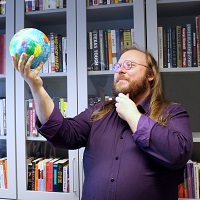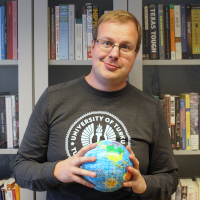Postdoctoral Projects
Below you can find the current postdoctoral research projects:
The Conceptual Language of Antifeminism and Reactionary Realignment in the United States
Postdoctoral Fellow Pekka M. Kolehmainen

This TIAS Postdoctoral Fellow project examines antifeminism as a political logic that connects different reactionary movements across ideological and temporal boundaries in the United States. The project argues that antifeminism has linked these movements together and furthermore served as a bridge to the more mainstream brands of conservative ideology. It has formed a funnel that leads people down a path of radicalization/ideologization, by attaching individual statements against feminism into wider reactionary ideological patterns.
The project’s approach is conceptual historical. It sees antifeminism as operating by seizing and redefining the meaning of terms and concepts—such as “gender,” “feminism,” “masculinity,” “femininity,” and “intersectionalism”—and mobilizing these new meanings for explicitly reactionary political ends. Through this conceptual historical framework, the study tracks the key concepts antifeminism has used at different stages of its spread and explores a vital ideological realignment taking place through the larger nexus point of the culture wars.
While often the culture wars are seen as an emerging set of cultural and political conflicts surrounding questions of values, this project rather approaches them as outlines for political action, through which various political operatives assign meaning to their own acts as well as those of their political/ideological opponents and build antagonistic structures between different phenomena. By focusing on the output of political organizations and advocacy groups, my study maps out the conceptual strategies used and developed by a burgeoning culture war industry aimed at producing political hostility.
More information: pmkole[at]utu.fi
Breaking the News: How Congress Remade Television News
Postdoctoral Fellow Oscar Winberg

This TIAS Postdoctoral Fellow project studies how congressional pressure, hearings, and legislation remade television news in the United States, circa 1968–1974. To understand our current moment of “infotainment” news requires an appreciation of television not just as media but as a political institution formed by other political institutions. Between the early 1960s, when television surpassed newspapers as Americans’ primary source of news, and the rise of social media in the 2010s, television ruled political life. Following the ascendance of television, however, the 1970s marked a turning point towards “soft” news intended to entertain, rather than inform, audiences.
This project studies the role Congress, often ignored in favor of the executive branch in the history of television news, played in this turn. Turning to the legislative branch reveals how the foremost news medium transformed from a political adversary into an accessory. The legislative branch ushered in the modern polarized, and polarizing, “infotainment” era of news.
At the nexus of political science, history, media studies, and American studies, this project recognizes the central role of television news in modern political life and the way political actors can form media institutions. Advancing a new appreciation for Congress in the remaking of news media, it contributes to broader conversations around the role of media in political life today, including debates around political efforts to delegitimize modern forms of media, declining public trust in news, and other challenges of political journalism today.
More information: ohbwin[at]utu.fi

